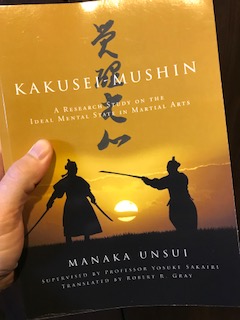
The book I translated for Manaka Unsui came out last month. I was particularly interested in translating this work because the main topic was “mushin.” Manaka Unsui says that this mental state is the most valuable thing he has taken away from his decades of training in martial arts. I was feel the same way, which is why my own dojo is named the “Fudo Dojo,” from the word “fudoshin,” one of the forms of mushin.
This book is a research study he did at the University of Tsukuba on the mental state of mushin. In Yagyu Munenori’s “Heiho Kadensho” and in Miyamoto Musashi’s “Book of Five Rings,” they both describe mushin in different words, but the essence is the same. They both teach that this is the most important state in actual combat.
Manaka Sensei says he wanted to understand why this was the highest state and and see if he could find scientific evidence for it. He entered the University of Tsukuba at 70 years old, under the direction of Professor Yosuke Sakairi. After completing his research study he turned it into a book which I translated over the last year or so.
The book includes an extensive look at the literature that was studied by samurai. Some of the works mention mushin directly while others give us unique insights into the knowledge and lives of samurai.
Here’s a passage I found interesting in the Joei-shikimoku (The laws and rights of the warrior class). In article 15 of that document it says:
For the crime of forgery of documents:
In the case of a samurai, his government position will be lost and his land will be confiscated. If the samurai doesn’t have a government position or own land, then he is to be exiled to a distant island or some remote place. This is to be monitored by the provincial governor. Someone other than a samurai who commits this offense shall be branded on the face.
After looking at the literature research, Manaka Sensei discusses what numerous schools of kobudo have to say about mushin. This not only includes the schools within the Jinenkan but also other schools such as Heki Ryu and Niten-Ichi Ryu.
Next he takes a deep look at the different forms of mushin including heijoshin, fudoshin, and what he has termed “kakusei-mushin.”
Finally he gives practical advice on developing and maintaining these states in training and in our daily lives.
I’ll end this with one of my favorite quotes from the book.
“The people are my castles and my stone walls. We show compassion for allies and vengeance for enemies.”
— Takeda Shingen, Sengoku period daimyo